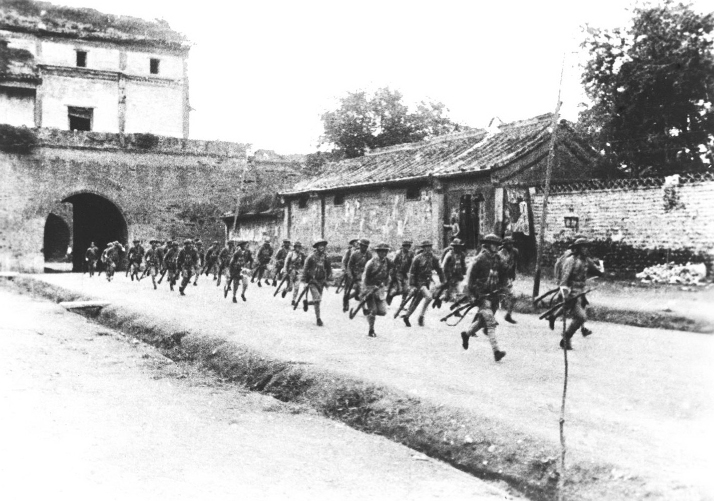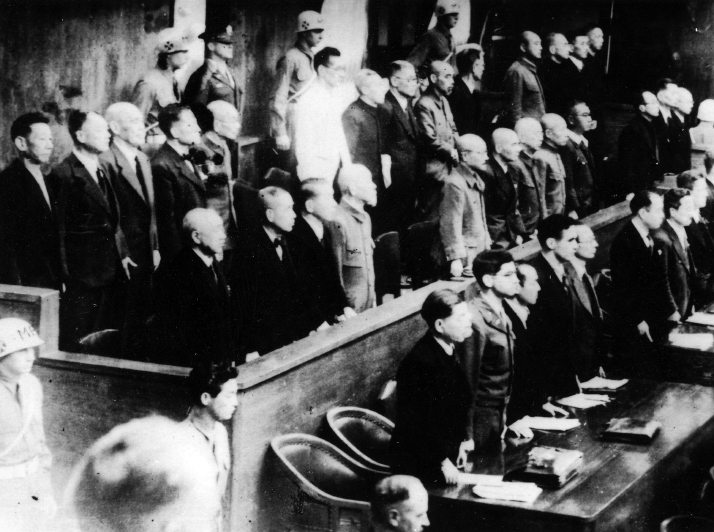| Voice |
| What war means | |
|
|
 Chinese troops rush to the Lugou Bridge, also known as the Marco Polo Bridge, in the suburbs of Beijing following an incident there on July 7, 1937. The Lugou Bridge Incident, in which invading Japanese forces attacked a town near the bridge, was the beginning of China's all-out war of resistance against Japanese aggression (XINHUA)
In a recent interview with Beijing Review, Wang Chaoguang, former Director of the Institute of World History, Chinese Academy of Social Sciences, explained why victory over fascism should be commemorated eight decades on. Edited excerpts from the interview follow: Beijing Review: Why do Chinese sources often refer to World War II (WWII) as the World Anti-Fascist War? How are they different and what is the relationship between the two? Wang Chaoguang: China refers to WWII as the World Anti-Fascist War in recognition of its nature as a war primarily against the aggression of Nazi Germany, fascist Italy, militarist Japan and others, forming the Axis powers—commonly called the fascist camp. On the other side were countries including China, the Soviet Union, the United Kingdom and the United States, forming the Allied powers—commonly called the anti-fascist camp. The Axis powers launched aggressive wars of conquest, violating the sovereignty of the nations they invaded. In the process, they committed genocide, large-scale massacres of civilians, indiscriminate bombing of cities, the deployment of biological and chemical weapons, the forced conscription of laborers, the sexual slavery of women, the mistreatment of prisoners of war, and other grave violations of fundamental human rights, humanitarian principles and human dignity. These crimes against humanity flagrantly contravened international justice and law. They have been universally recognized as war crimes and were confirmed as such at the Nuremberg and Tokyo trials following the war. For these reasons, China honors the great victory of the World Anti-Fascist War as a triumph of justice over evil. Referring to WWII as the World Anti-Fascist War highlights its nature and origins and is a reminder of what was at stake in the conflict.
 The International Military Tribunal for the Far East in session in Tokyo, Japan. The tribunal, which lasted from 1946 to 1948, convicted 25 Japanese militarists of responsibility for war crimes and crimes against humanity (XINHUA)
Many people around the world consider the war in China to be part of the Pacific theater, not a separate theater. But actually, the Chinese people held ground in a main Eastern theater of the World Anti-Fascist War. What can you share on this topic? The Eastern theater of the World Anti-Fascist War mainly comprised three interconnected yet distinct theaters: the China theater, the Southeast Asia theater and the Pacific theater. Although together they form what is often called the Eastern theater, each operated more or less separately in military terms. It is incorrect to regard the China theater as part of the Pacific theater. China was the first to resist fascist aggression (beginning in 1931). In other words, China was the earliest to recognize the global threat posed by fascist expansion and stand up against fascist aggression. China's resistance lasted the longest (1931-45). During those 14 years, China tied down vast numbers of Japanese troops as well as huge military, economic and social resources—resources that could otherwise have been deployed elsewhere. China's forces destroyed large numbers of Japanese troops. In doing so, China suffered enormous casualties and losses. The country also sent expeditionary units abroad to fight alongside Allied forces and provided other Allied nations with military and economic support. China supported the independence movements of colonized peoples, making a vital contribution to the post-war wave of decolonization and the rise of newly independent states. For instance, Korea established a provisional government in Shanghai in 1919 to resist Japanese colonial rule. Following the Japanese invasion of China, it was moved to Chongqing in the southwest. China played a key role in shaping the post-war international order centered on the United Nations. By becoming both a founding member of the UN and a permanent member of the UN Security Council, China's important status within and contribution to the anti-fascist Allies were fully affirmed and highly praised at the time. What lessons did the world learn from the World Anti-Fascist War and what relevance do they continue to hold in today's world? WWII brought tremendous sacrifices and heavy losses to humanity and the world. Reflecting on the past and taking history as a mirror, the international community has drawn ample lessons from this war, which remain of great relevance. At critical junctures in history, one should stand on the side of what is right. In brief, this means upholding humanity's shared values, promoting human rights, humanitarianism and human dignity, and safeguarding peace and development so that people can live under the sunshine of peace rather than be trapped in the horrors of war. We must share historical and contemporary responsibilities, uphold justice and fairness, protect every country's right to equitable development and promote progress among all nations. We must uphold the post-war international order. This order was won at great cost by humanity, still holds vital importance today and must not be allowed to be dismantled, lest the world descend once more into chaos. We must resist hegemonic bullying by a few states—whether political, economic, cultural or otherwise. Such bullying undermines the equal right of all peoples to develop. In light of the lessons of WWII, this warning ought to resonate ever more strongly. Copyedited by G.P. Wilson Comments to yanwei@cicgamericas.com |
|
||||||||||||||||||||||||||||
|